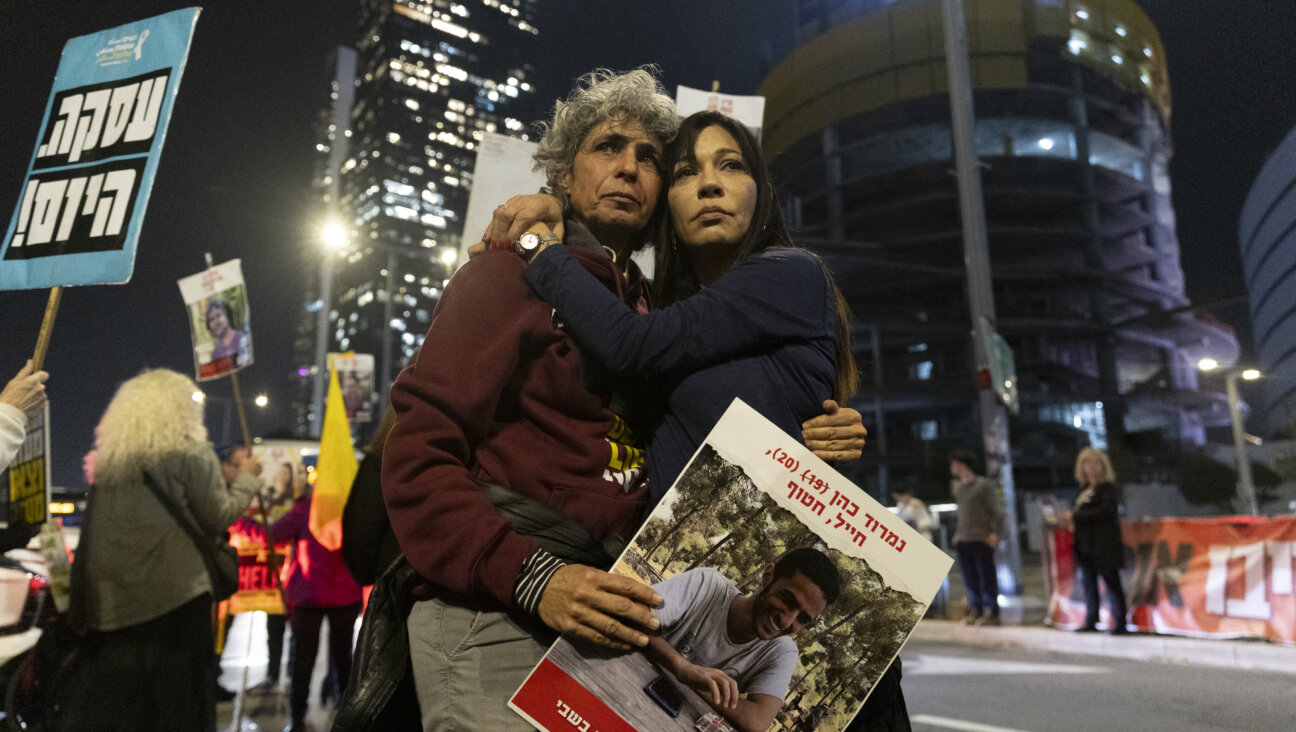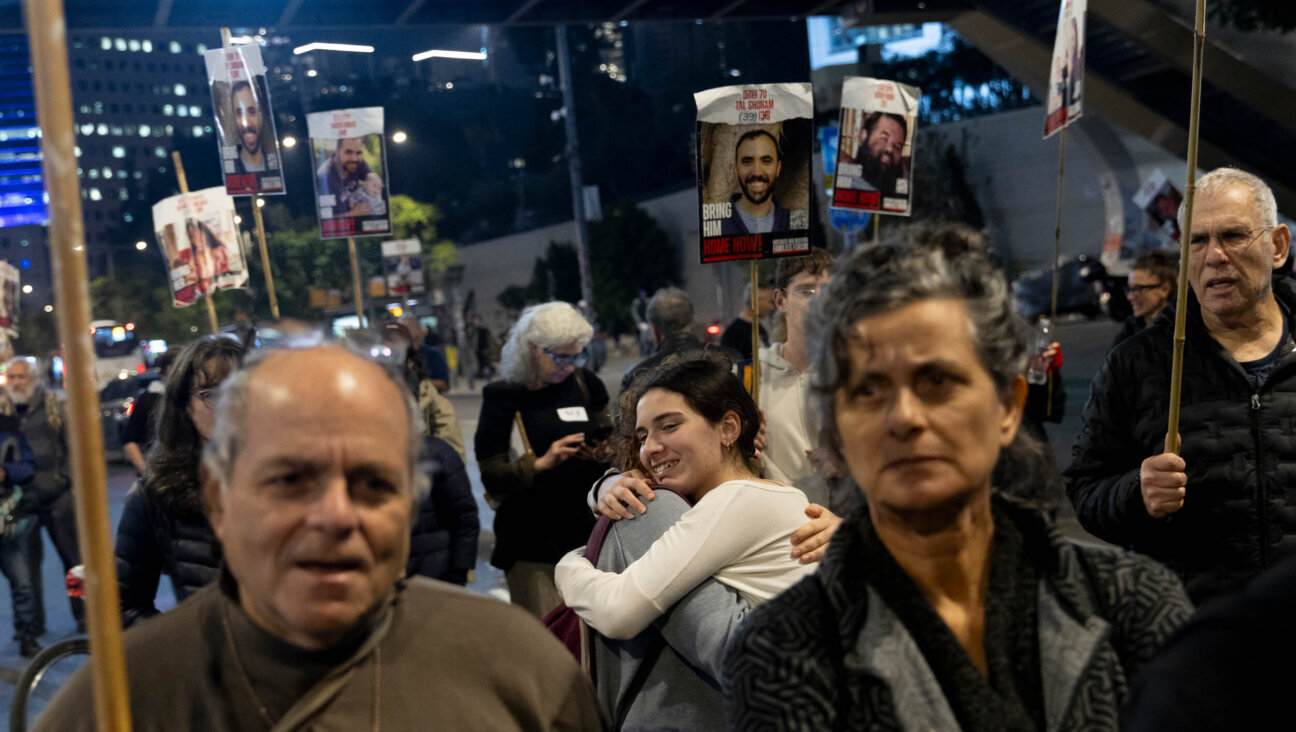Jewish Community Cautious as U.S. Attack on Syria Looms Large

Image by getty images
America’s organized Jewish community has long been united in its abhorrence of the dictatorship ruling Syria. Yet it has been notably hesitant and, at times, muted in reacting to the large-scale chemical weapons attack allegedly carried out by loyalists of Syria’s president, Bashar al-Assad.
Despite the community’s strong opposition to any use of nonconventional weapons, Jewish activists have sat on the sidelines of the intense debate, provoked by shocking footage showing scores of men, women and children apparently suffering from nerve gas poisoning in Syria.
“The Jewish community is cautious,” acknowledged Abraham Foxman, national director of the Anti-Defamation League.
Foxman said that he himself supports an American military move in response to the use of chemical weapons. But his organization, like most other Jewish groups, refrained from making public statements on the issue. “There is a sensitivity of not jumping ahead of the administration,” Foxman said, tying this sensitivity to “the Jewish community’s experience of being falsely accused of things it hasn’t done.”
These accusations date back to the 2003 American invasion of Iraq, when critics accused the Jewish community of pushing America to launch the military campaign in order to benefit Israel.
Despite the claims, the organized Jewish community never endorsed the Iraq War, and in fact, most rank-and-file American Jews opposed the move. Similar accusations were made in recent years, when discussing America’s options for dealing with Iran’s nuclear ambitions. In this case, many Jewish activists have emphasized the importance of keeping the military option on the table.
The August 21 attack on a suburb of Damascus, held by the rebels, killed, according to the opposition, more than 1,300 men, women and children. The worldwide condemnation that followed videos and photos of wounded Syrian civilians, including children who died in their sleep as a result of the apparent sarin nerve gas attack, has pressured President Obama to act. Many calling for military action cite his warning a year earlier that Syria’s use of chemical weapons constituted a red line for the United States.
By August 27, Obama seemed poised to strike, ordering warships and an aircraft carrier to move to the region, and authorizing the Pentagon to come up with a variety of plans for a possible military strike aimed at punishing Assad. On August 26, Secretary of State John Kerry called the attacks a “moral obscenity” and said the fact that Assad used chemical weapons against his own people was “undeniable.”
But the Jewish community, often among the first to respond to international human rights violations and war crimes, especially by Arab governments, stuck to a measured response as preparations quickened toward a military strike. Most Jewish groups avoided or delayed issuing public statements on the matter.
“The Jewish community has a long-standing record against the use of nonconventional weapons,” said Rabbi David Saperstein, director of the Religious Action Center of Reform Judaism. “But just because we may think it is a moral issue to use force to curtail the use of nonconventional weapons, it doesn’t necessarily mean it is always the wise thing to do.”
While wholly rejected by Jewish leaders, the image of American Jews pushing the United States to wars that would benefit Israel, Saperstein said, has led the Jewish community “to be reticent about taking the lead on what should be done, but not about the need for something to be done.”
The American Jewish Committee, while refraining from making public statements on the issue, provided the Forward with a statement expressing limited endorsement to a decision to strike Syria. The AJC focused on Obama’s statement that using chemical weapons would trigger an American response, and said that since it now appears that Assad did use such weapons, “AJC believes that President Obama has no choice but to take action.”
Otherwise, the group warned, the United States would lose its credibility in the region and would thereby send the wrong message to America’s allies and foes.
“We’re not eager to engage the Syria debate per se,” the AJC’s executive director, David Harris, said in an interview. Terming the Syrian issue “very complex and multilayered,” Harris said his group is careful not to call for a “whole new campaign against the Assad regime.”
Jewish activists not affiliated with the major organizations felt a greater sense of freedom. A letter signed by leading thinkers and foreign policy experts urges Obama to “use standoff weapons and airpower to target the Syrian dictatorship’s military units that were involved in the recent large-scale use of chemical weapons.”
The letter also suggests supplying arms to rebel forces and considering direct attacks against Assad’s regime. Signatories include Jewish activists aligned with the neoconservative camp, such as William Kristol; conservatives, including Elliott Abrams; centrist Joseph Lieberman, and liberal Leon Wieseltier.
Complicating the Jewish response to this crisis is the community’s consideration of Israel’s interests. Even as the community’s reluctance to take the lead in calling for military action has become clear, Israel has made clear its belief that the international community should take action.
Writing on his Facebook wall, Israel’s economy minister, Naftali Bennett, called on “Jews of the world” to speak up.
“Don’t remain silent” in face of the killing in Syria, the Cabinet minister exhorted. “The Jewish People, and I, as a minister in the government of the Jewish state, have a special duty to speak up, to yell, so the world will hear and stop ignoring what’s going on in Syria.”
In a call that could be seen as directed only at Washington, Israel’s prime minister, Benjamin Netanyahu, said on August 26 that “Iran is watching, and it wants to see what will be the reaction to the use of chemical weapons.” These comments, alongside similar sentiments expressed by columnists supportive of the Netanyahu government, mark a shift in Israel’s approach to the Syrian civil war, which has been raging for two and half years.
Initially, Israel made clear that it was not taking sides in the conflict. It limited its response to issues directly related to its own security — primarily the use of Syrian land for transferring advanced weapons to Hezbollah.
Israel’s change of tone suggests that it now sees a lack of American response to the overt use of chemical weapons as something that would embolden the Syrian president and his allies in Tehran in a way that could be harmful to Israel.
According to press reports in Israel, the administration of the United States made clear to Israel that any military strike would be carried out without having American troops on the ground. This message could ease concerns in Jerusalem that an extensive military campaign in Syria could distract America’s focus from Iran and its nuclear ambitions.
Meanwhile, even as it shies away from taking the lead on the military front, the Jewish community has increased its involvement in humanitarian help to victims of the civil war. The Jewish Coalition for Syrian Refugees in Jordan has raised and distributed more than $200,000 and is still raising funds in the community. The money has gone to support work done in the Jordanian refugee camps by the Red Crescent, World Jewish Relief, the International Rescue Committee and the Hebrew Immigrant Aid Society.
Contact Nathan Guttman at [email protected] or on Twitter, @nathanguttman
A message from our Publisher & CEO Rachel Fishman Feddersen

I hope you appreciated this article. Before you go, I’d like to ask you to please support the Forward’s award-winning, nonprofit journalism so that we can be prepared for whatever news 2025 brings.
At a time when other newsrooms are closing or cutting back, the Forward has removed its paywall and invested additional resources to report on the ground from Israel and around the U.S. on the impact of the war, rising antisemitism and polarized discourse.
Readers like you make it all possible. Support our work by becoming a Forward Member and connect with our journalism and your community.
— Rachel Fishman Feddersen, Publisher and CEO
























